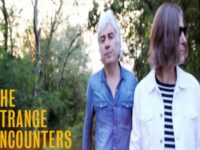by Nick DeRiso
Emory Quinn doesn’t quibble about genre. Heck, this happy-go-lucky San Antonio, Texas-based band can’t even stick to one instrument, with its principal members merrily switching from one to another. That makes for a nice metaphor on See You At The Next Light, an album of restless musical ambition and jangly, country-fried delights.
The group’s sound is principally shaped by guitarist Nathan Rigney, a classical music prodigy who appeared at Carnegie Hall with the Texas State Youth Orchestra. His clean, percussive style is perfectly suited for moving around inside of the expectations, often within the confines of a single tune.
Late in “Hand in Hand,” for instance, Rigney tosses aside the song’s shambling Jakob Dylan-sounding template for a soaring, anthematic hook. The same goes for “Moving On,” a Southern rocker that ramps up into something approaching greasy metal after Rigney’s squalling, reverb-soaked turn. As See You At the Next Light closes, we find Rigney indulging in some alliterative banjo picking, playing against the guitar-hero type.
Vocalist and main songwriter Clint Bracher, working the same fertile ground as Austin’s Band of Heathens and Walt Wilkins, connects the dots with a rough-hewn, hill country magnetism. He writes convincingly about good-time guys stopped cold by circumstance through Emory Quinn’s fourth long-player. There’s no shortage of optimism, even though Bracher can’t get away from the arm-waving confusion found along life’s precipices.
“Holes through the Windows” rattles along like a luminous lullaby, until a closer examination of the lyrics reveals the dark passions at play here. Bracher’s subject, surrounded by bloody shards of broken glass, has been forced to shoot down a lady friend’s returning antagonist.
On “Tear Down the Walls,” a stomping country lament that recalls Robert Earl Keen or the Drive-By Truckers, Quinn gives himself over to the sweet dangers of a woman. But he doesn’t enter the negotiations without some sense of what’s at stake: “I roll the rice,” Bracher quietly sings. “Hope they roll my way.”
His characters have seen some things, some bad things. But that doesn’t mean they are ready to give up.
“Don’t look and you will find,” Bracher sings on “Heart In Mind,” bolstered by a delicately ardent musical accompaniment. “Stop making plans and let your heart in your mind.” Even when he looks back on a faded love affair on “Finds Danger,” Bracher fashions a narrative with an itinerant romanticism.
Rigney’s ringing, Byrds-like jingle makes it almost impossible to fall too far into regret, anyway. Together with multi-instrumentalist Case Bell, this group of Texas A&M University products skip through musical classifications like a flat stone over the surface of a still lake. It’s country rock, to be sure, but quickly followed by a series of widening regional influences, including bluegrass, conjunto, arena-rock and Americana folk.
“Be Here Now,” a starkly honest personal assessment by a faithless lover, boasts a hard-drinking twang to match. “When I Dream” makes nice use of an electric piano signature, reminiscent of country rock’s period of ascendency in the early 1970s.
“Calling Your Name” sounds something like Exile on Main Street-era Rolling Stones, with this lazy pace that belies an emotional turbulence just below the surface. Then “Falling Down Again” comes crashing in, powered forward by drummer Erik Frankson, a fellow Texas A&M alum who joined in August 2010.
What better way to end things than with a winking apology after a night of indulgence?
In so doing, See You At The Next Light deftly sidesteps the shiny sentiments of today’s Nashville mainstream, yet avoids the mannered aridness sometimes associated with alt-country.
They’re too busy having a good time.
- Nick DeRiso’s Best of 2015 (Rock + Pop): Death Cab for Cutie, Joe Jackson, Toto + Others - January 18, 2016
- Nick DeRiso’s Best of 2015 (Blues, Jazz + R&B): Boz Scaggs, Gavin Harrison, Alabama Shakes - January 10, 2016
- Nick DeRiso’s Best of 2015 (Reissues + Live): John Oates, Led Zeppelin, Yes, Faces + others - January 7, 2016





